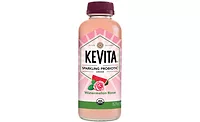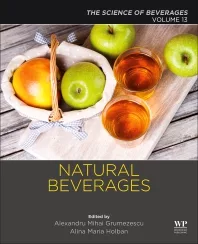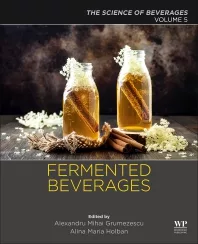Fiber, probiotics add functional benefits to beverages
Probiotics projected to rise more than 7 percent annually through 2020

Some 60 to 70 million Americans suffer from a wide range of digestive health issues, including constipation, diverticulosis, diarrhea and Crohn’s disease, according to the National Institutes of Health. The demand for products containing fiber, prebiotics, probiotics and “good” bacteria is on the rise as functional beverages to combat illnesses and improve consumers’ overall health have moved from niche products in specialty stores to mass retail and grocery store chains.
“Overall, this shift in consumer attitudes is upping the demand for new offerings in the functional beverage space. Convenient, better-for-you and experience beverages that offer targeted health benefits are in demand,” says Michael Bush, executive director for Wellmune and GanedenBC30 at Beloit, Wis.-based Kerry. “Because of this, leading manufacturers are looking to create functional beverages that align with consumer interest and values. As a proof point to this, we are seeing more demand for functional ingredients and beverages that include probiotics because of the digestive and immune support benefits they offer.”
After probiotics, consumers are seeking the nutritional benefits of fiber, according to Michael Q. Kemp, Kerry’s nutrition manager in North America. “Companies have traditionally tried to fill this need with fructan fibers, such as inulin. Unfortunately, these types of fibers are prone to causing gas and stomach pain,” he says. “With that said, customers are increasingly interested in using fibers that are easier to tolerate. We have seen a large interest in using fiber like gum acacia and Arabic, which is derived from the sap of the acacia tree. These fibers are unique in that they are much more easily tolerated than inulin, but can promote 6-10 times healthier probiotic cultures.”
Although consumers slowly are beginning to understand digestive health as it relates to the microbiome, Taylor Halstead, product manager for specialty carbohydrates at Minneapolis-based Cargill, suggests more education is needed so that consumers fully understand the benefits of digestive ingredients in their bodies.
“Even at the research level, we’re still learning exactly how probiotics and prebiotics fit together,” Halstead says. “Still, while this may be a new idea, it has exciting possibilities for consumers. We’re already seeing some innovative beverage-makers bring these ‘symbiotic’ products to market, which combine prebiotic fibers and probiotics. As the science advances, we expect this market will continue to grow.”
Marlena Hidlay, marketing manager at DSM Nutritional Products, Parsippany, N.J., expresses similar sentiments. “There is an opportunity to educate consumers on the benefits of prebiotics. Prebiotics are emerging as the next super ingredient for digestive health,” she says. “According to a Markets and Markets report on prebiotics (2015-2020), 29 percent of American consumers associate prebiotics with healthy digestion and microbiome. The prebiotics’ market is expected to grow 44 percent through 2020, creating an opportunity for consumer packaged goods to help shape the market.”
Although 93 percent of Americans believe fiber is an important ingredient for their digestive health, it is an “under-consumed nutrient,” with most Americans consuming less than half of the recommended amount of dietary fiber, Hidlay adds.
Restoring a healthy balance
A third of Americans said they were trying to consume probiotics and 10 percent were working to add prebiotics to their diets, according to the International Food Information Council’s 2016 Food & Health Survey.
Experts note that 70 percent of the body’s immune system is connected to the digestive tract. Prebiotics, often contained in kefir and some types of yogurt, are non-digestible fibers that promote the growth of beneficial bacteria already living in the digestive tract and must be fermented in the gut, Cargill’s Halstead says.
On the other hand, probiotics are naturally occurring helpful living bacteria and yeasts that populate the digestive system and keep things balanced and working smoothly. Although probiotics are found naturally in the body, they also are present in many foods and supplements, she adds.
Among the factors that can disturb the intestinal balance and decrease the level of beneficial bacterial in the gut are a poor diet or changes in diet, medications and antibiotics, stress, age, illness and travel, Kerry’s Bush says.
Yet, the amount of probiotics and the strain being used can determine the derived health benefit. “Efficacy is strain-dependent and claims need to be supported by strain-specific data,” Bush explains. “GanedenBC30, at a daily consumption rate of 1 billion [colony-forming units] (CFUs), provides digestive and immune support as well as protein utilization support.”
An extremely stable probiotic, GanedenBC30 Baccilus coagulans GBI-30, 6086 works by forming a protective spore on the cell, the company says. Bush explains that GanedenBC30 spores wait to germinate until they reach the intestine when the moisture level, temperature and food source levels are just right.
Clinically supported in more than 25 published studies, GanedenBC30 Baccilus coagulans GBI-30, 6086 is available in more than 900 products worldwide, including dairy products and hot and cold beverages, Bush says. The ingredient also is Non-GMO Project Verified, gluten free, kosher, halal and GRAS affirmed.
In the beverage market, high-pressure processed (HPP) or cold-pressed juices that feature probiotics are a continuing trend, according to Bush. Kombuchas and drinking vinegars also support digestive health trends, which continue to gain recognition.
The Netherlands-based Innova Market Insights reports that 19 percent of functional drinks launched in 2017 had a digestive/gut health claim.
“This is a statistic we expect to grow,” says Ilana Orlofsky, marketing manager at Imbibe, Niles, Ill. “In addition to hearing about ingredients that support digestive health and balance in general, namely fiber, probiotics, ginger and apple cider vinegar, we have started to see even more products make a digestive health claim or call attention to the benefits these products may deliver. A tea brand, Teasäne, recently launched a line of 26 wellness teas … and one herbal blend is aptly named Digestive Health for optimal digestion.
“While probiotics are naturally occurring in several categories within food and beverage, many are fortified for efficacy,” she continues. “Probiotics are naturally found in kombucha, kefir and yogurt, though now its commonplace to also find probiotics in waters (Suja, Matt’s), juices (Goodbelly, Tropicana) and non-traditional sparkling probiotic drinks from brands like Live Beverage, GT’s and KeVita.”
As the market for probiotic beverages continues to grow, more shelf-stable products also are hitting store shelves. Topped with the patented Karma Push Cap, Pittsford, N.Y.-based Karma Wellness Water offers its Probiotics lineup. The KarmaCap releases 2 billion CFUs of GanedenBC30 along with vitamins A, E and B complex with the push of a button, the company says. GandedenBC30 delivers live cells 10 times more effectively than common probiotic yogurt cultures, it adds.
On the refrigerated side, Los Angeles-based Califia Farms LLC recently launched a line of dairy-free yogurt drinks made with the Califia Culture Blend, a trio of 10 billion live, active probiotic CFUs powered by Bifidobacterium (BB-12).
Functional beverages containing pre- and probiotics are resonating in the market. USDA-certified organic refrigerated juices and functional beverages generated sales of more than $722 million and increased market share nearly 22 percent in multi-outlets for the 52 weeks ending Dec. 3, 2017, according to data from Chicago-based SPINSscan. The USDA-certified organic category had sales of more than $3.1 billion and year-over-year growth of 5.4 percent, the data reports.
Fiber follows function
To align with the needs of beverage manufacturers, ingredient suppliers are developing new digestive health ingredients.
For instance, Cargill offers the prebiotic Oliggo-Fiber, a label-friendly, non-GMO option to promote digestive health. “Known as the ‘invisible fiber,’ Oliggo-Fiber chicory root fiber is a soluble fiber that can be used by beverage-makers without affecting the taste or texture of the final product,” Halstead says. “… As a prebiotic, it enhances the growth of Lactobacillus and Bifidobacterium species. Consuming five grams of chicory root fiber per day stimulates the microflora in the digestive tract, helping to maintain a neutral balance.”
In a joint venture, Chicago-based Archer Daniels Midland Co. (ADM) and Matsutani LLC offer Fibersol-2, a corn-based, soluble fiber that can be used in beverage applications to help consumers increase the amount of fiber in their diets. In addition, the ingredient, which can be incorporated with whole grains, probiotics and prebiotics, has been clinically shown to help maintain intestinal regularity, according to the company’s website.
Ingredient suppliers also have found solutions that allow for low dosages during fortification. Exclusively distributed by DSM Nutritional Products, AmpliVida XOS Prebiotic is organically grown in California from non-GMO, high-fiber sugar cane and processed with pure water. “AmpliVidia is efficacious even at a low dose,” Hidlay says. “… Only 1-4 grams are needed daily to selectively stimulate the growth of beneficial probiotic bacteria in the digestive tract.”
Experts note that pre- and probiotics have been a hot topic in the nutrition market for several years. As plant-based eating remains popular, consumers are desiring more functional products that improve their overall health.
“Consumer interest in digestive health is far from waning,” Imbibe’s Orlofsky says. “The expected growth of the probiotic market is expected to rise at a [compound annual growth rate] (CAGR) of 7.4 percent through 2020 and kombucha is projected to rise 25 percent each year through 2020.” BI
Looking for a reprint of this article?
From high-res PDFs to custom plaques, order your copy today!








